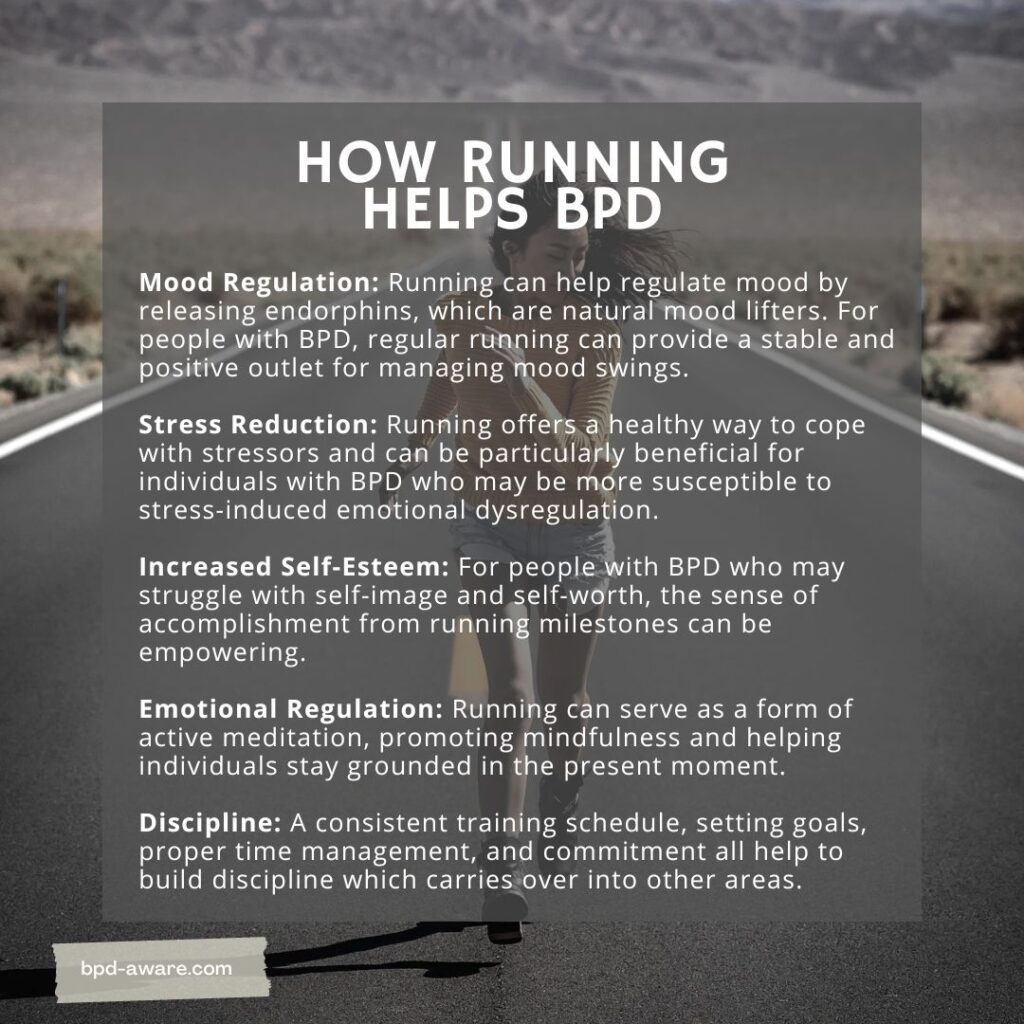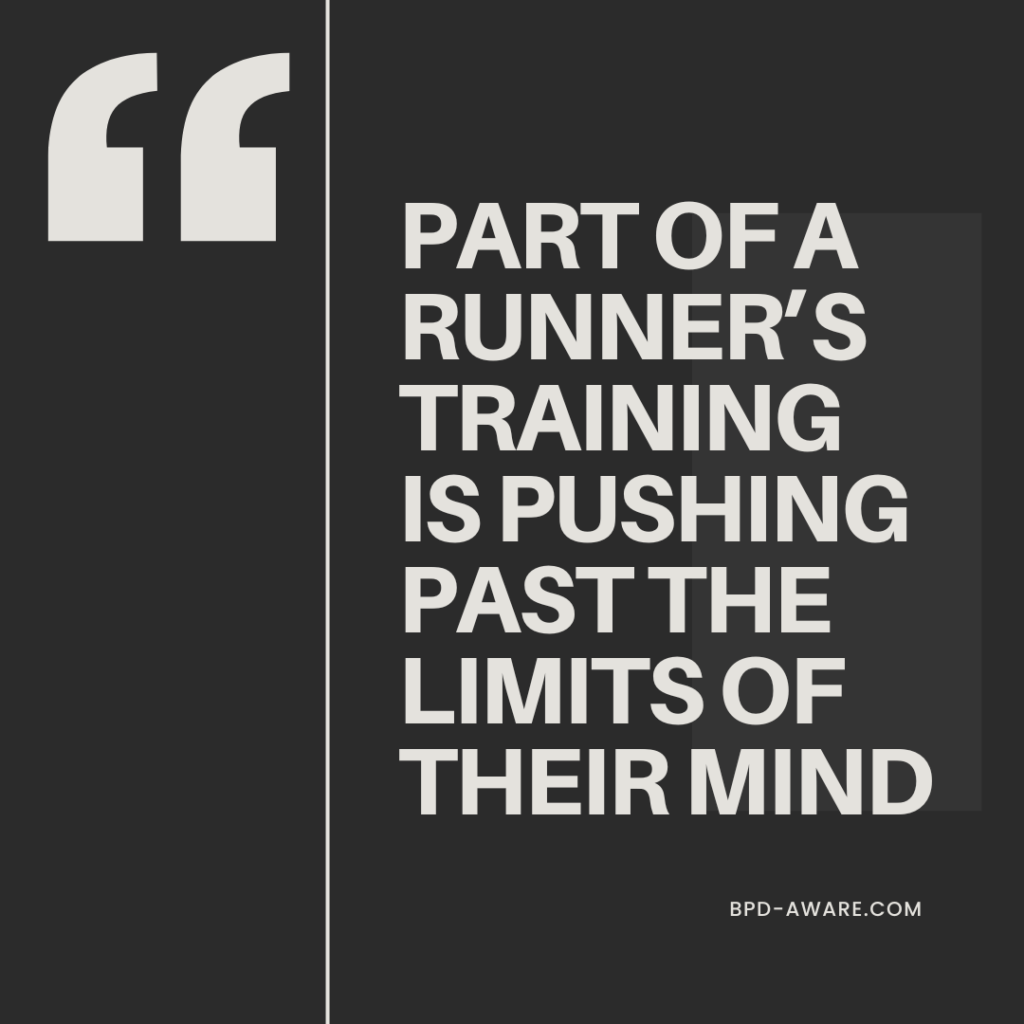I’ve talked in the past about how the PLEASE skill from Dialectical Behavior Therapy was one of the most important techniques in my recovery from Borderline Personality Disorder (BPD). It made me re-evaluate the relationship between my physical health and mental health.
While I was never one for illicit substances, I did eat and drink plenty of junk. I began to take better care of what I put into my body. I cut down on sugar and caffeine and felt better for it. My energy levels began to improve and my mood swings lessened. What that did for me was give me the energy and motivation to begin taking exercise more seriously. I’d always walked a lot and done other bits and pieces, but there was never any real drive behind it.
Then I decided to go for a run. I won’t lie, the first run was HARD. It was a breezy day and whichever way I ran, the wind seemed to suck the breath right out of my lungs. I set out to run three miles and I just about managed it. My legs were a little achy the next day, but nothing too bad. A day after recovery, I went on another run. This time I was a little quicker and it felt a little easier. I maintained a routine of running every other day for a couple of weeks and saw immediate progress in my running.
Most of my running was and still is done in my local park. Getting out in the fresh air, surrounded by nature gives my mental health a lift. At its best, running is a meditative practice that allows you to empty your mind and concentrate purely on the act of running. The beautiful scenery rolls by and you feel completely at one with yourself and your surroundings. At its worst, it can feel pretty torturous. If you want to look on the bright side of that though, it teaches you discipline and how to tough out the bad moments.
It’s this mindfulness, discipline, and resilience that I believe have helped me better manage my symptoms of BPD. There was a definite correlation in my recovery between taking care of my diet and getting more exercise. Another benefit was the boost to my self-esteem that running has given me. When I improve on one of my running times, run further than I have before, or finish a race, I feel a tremendous boost which can carry over for days.

Getting Started Running
If you’re interested in getting started running to see if it can help you with the BPD symptoms, you might want to know what you need to get started.
When I first started, all I had was one pair of running sneakers – and I believe that’s all you need to begin. There’s no point spending a bunch of money on something that you don’t know whether or not you’ll stick with. As much as I love running, I realize that it’s not for everyone.
If there’s one other thing I’d recommend, it’s a running schedule. The exact schedule you choose needs to be tempered to your athletic ability. I already did some other forms of exercise, so I was able to take to running fairly quickly. However, it’s important to start slowly and let your body adjust to the new pressures you’re putting on it. Going on a run/walk where you run slowly for a couple of minutes and then walk for a couple of minutes, twice a week, is a good start. You can progress to reducing the amount of time you spend walking until you can run a mile or two without stopping. At this point, you may want to add another run to your routine and start upping the distance a little.
If you do get bit by the running bug, I’d recommend buying two or even three pairs of running shoes and alternating between them on each run. This can help you avoid injuries and also extend the life of your running shoes.
When you get really serious about running, a running watch can be very useful. They can track your distance, the elevation of your course, your heart rate, your miles per minute, and a lot of other useful statistics.
The most important thing is to get out there and get running. Running doesn’t have to be an expensive hobby. No amount of equipment or gadgets will get you out of the house, running those hard miles. All you need is a pair of running shoes and the will to get out there.
The Running Community
One of the pleasant surprises about picking up running was how supportive the running community is. Whether it’s online forums or local run clubs, I’ve found that runners offer a much more positive and supportive community than most other hobbies. People are happy to welcome newcomers, offer sound advice
Feeling like you’re part of a tribe that’s got your back can be incredibly helpful when you have BPD. It might not directly deal with BPD but a supportive community can help make you feel accepted and boost your self-esteem. The social connections you develop can benefit the way you deal with relationships in other areas of your life too. You can learn what positive, supportive relationships should look like.
Self-Care and Listening To Your Body
Another aspect of running that perhaps goes underrated is that it forces you to listen to your body and practice self-care. After I come back from a run, particularly a long one, I will take the time to stretch for a few minutes and then use a massage gun on my legs. Sometimes I might put ice packs on my knees if they’ve been bothering me.
I do suffer from bad knees. There are times when I have to be smart and not run on days I’m scheduled to run, to let them rest. Running through pain is rarely a good idea and can lead to injuries that knock you out of running for quite some time.
These are two skills that again can help with BPD. Running taught me how to take better care of my body and mind, when to take things easier, and when to push harder.

If Running Isn’t For You
Running isn’t for everyone, but that’s okay. There are so many other physical activities that offer similar benefits to running. Activities like hiking, yoga, weight lifting, cycling, martial arts, swimming, rock climbing, and tennis are great for staying fit. Experiment and find that activity that resonates with you and you will be rewarded in more ways than you can imagine.
Final Thoughts
Outside of therapy, running has been one of the most useful tools in my arsenal when it comes to coping and recovering from my BPD. It provides focus, meditation, discipline, resilience, and physical activity – all of which help me in so many ways.
Since I’ve taken up running I’ve found that I’m less irritable, my moods and emotions are more stable, and my self-esteem is much improved. Not only that, but my sleep quality is much better too.
While it has helped me a great deal, running is not for everyone. It’s hard on the joints and some just find it boring. However, there are plenty of great physical activities out there that can help others in the same way running has helped me.
If you want to improve your physical and mental health, try experimenting with various sports. When you find the right one for you, you’ll know.
Sources, Resources, and Further Reading
- Is Exercise a Treatment for Depression in BPD?: https://www.hopeforbpd.com/borderline-personality-disorder-treatment/exercise-for-bpd
- What can I do to help myself cope with BPD?: https://www.mind.org.uk/information-support/types-of-mental-health-problems/borderline-personality-disorder-bpd/self-care/
- Supporting Your Mental Health Through Exercise: https://borderlinepersonalitytreatment.com/mental-health-exercise/
- Movement Is Medicine: Exercise for Well-Being: https://www.psychologytoday.com/us/blog/keeping-an-even-keel/202406/movement-is-medicine-exercise-for-well-being
- Has vigorous exercise helped anyone with emotional regulation issues?: https://www.reddit.com/r/BPD/comments/uflb55/has_vigorous_exercise_helped_anyone_with/
- Could physical exercise be an effective treatment for adults with borderline personality disorder?: https://psycnet.apa.org/record/2020-94648-001
















